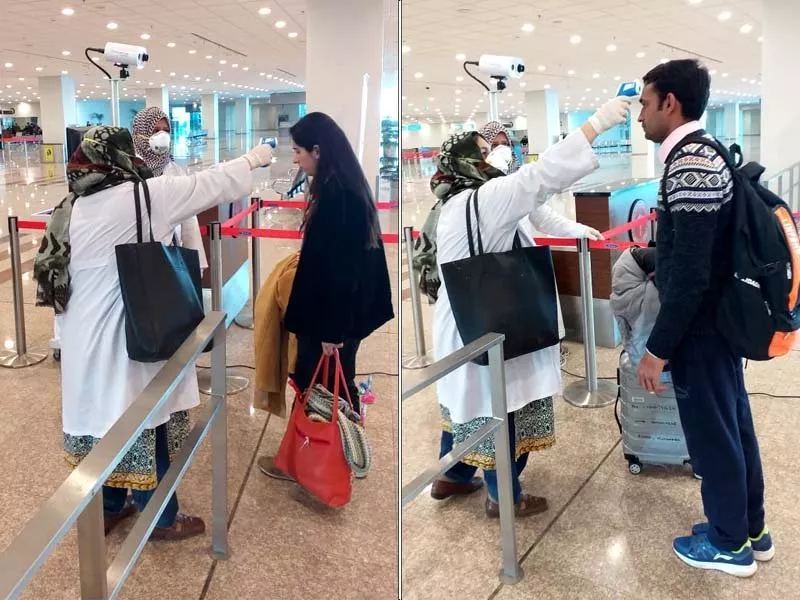1,500 people in Sindh to be screened for coronavirus symptoms
CM sets up taskforce, establishes 24/7 control room and helpline to deal with disease
KARACHI: The Sindh government has decided to screen 1,500 citizens who have recently travelled from Iran for coronavirus symptoms, as well as those who have been in close contact with them.In an emergency meeting held the day after Pakistan confirmed its first two coronavirus cases, Sindh Chief Minister Syed Murad Ali Shah also established a taskforce to deal with the disease. Headed by the chief minister, the taskforce will include the provincial chief secretary, health secretary, city commissioner and other officials.
"Coronavirus has become a global emergency and all nations will have to battle it with bravery and the best possible strategy," stated Shah, addressing a press conference later in the day, adding that a 24/7 control room and helpline to deal with coronavirus had been set up at the Karachi commissioner's office.
He informed the media that around 8,000 people from Pakistan had visited Iran in February. Of these, 500 people belonged to Karachi, while 1,000 were from other districts in the province.
He claimed that data was being gathered on these 1,500 people in Sindh so that trained medical personnel could monitor them and keep them in isolation at their residences. "In case of the emergence of coronavirus symptoms, they would be shifted to the hospital," he said, adding that they would only be tested if they were manifesting symptoms.
The CM further explained that Y*, the 22-year-old coronavirus patient from Karachi, had visited Iran with a group of 28 pilgrims. "We have established contact with each and every person in the group," claimed the CM, adding that they were being monitored and were voluntarily cooperating with the Sindh health department.
He also disclosed that Y's parents and sister had been screened and cleared. Even then, he added, they had been shifted to a hospital for quarantine and further monitoring.
Pointing out that the Iran-Pakistan border is a porous one, due to which people cannot easily be prevented from entering the country, the chief minister urged the federal government to take necessary measures such as shutting down flights from the neighbouring country and improving screening at airports.
"It is important that those who have already contracted the virus do not enter the country, so that the situation does not worsen," he stressed, adding that hospitals and doctors from the private sector were also willing to help the government.
In response to a question, he stated that a hospital had been dedicated to the diagnosis and treatment of suspected coronavirus patients. "I have requested the Aga Khan University Hospital (AKUH) to purchase all the required equipment and medicine for the hospital, while we will pay for these," he explained, adding that he had made this request because it would be faster for the hospital to make the purchase directly.
Discussing the two-day closure of educational institutions, Shah said that this would give time to the health department to screen the children of people who had visited Iran, while preventing them from interacting with others at school.
Meanwhile, AKUH's Dr Faisal Mahmood told the media that the virus manifests in patients within 14 days of contact, adding that patients were only given medicine for fever and cough. "The patients mostly recover through their own immune system," he explained. "Most of the patients survive; those over the age of 40 and those with asthma or weak immune systems are more prone to it.
The coronavirus helpline can be contacted at 021-99204452 and 0316-0111712.
Still in Iran
Speaking to The Express Tribune later, the Sindh health minister’s media consultant, Meeran Yousuf, disclosed that more than half of the 1,500 people who had travelled to Iran were still in the neighbouring country.
“We were given the exit list instead of the entry list,” she explained.
Yousuf also said that the pilgrims who had accompanied Y had been screened. “They are all fine. They do not have any symptoms,” she maintained, adding that they had been advised to limit any travelling. She further stated that doctors in their union councils would carry out random visits to monitor them.
*Name has been changed to protect identity


COMMENTS
Comments are moderated and generally will be posted if they are on-topic and not abusive.
For more information, please see our Comments FAQ